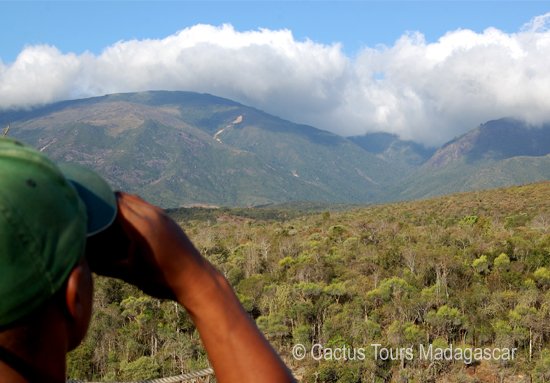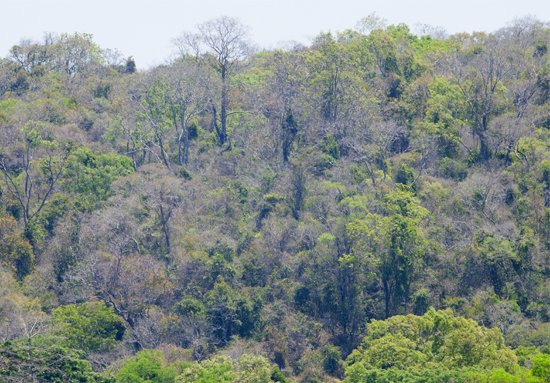The major birding sites of Madagascar
The following locations are amongst best-birding sites of Madagascar in term of species and distributions. Above that, they represent good samples of the bird habitats of the island.

The Kinkony complex
This site is composed of Kinkony Lake south of Mitsinjo City, Mahavavy Delta to the north, Marambitsy Bay and the maritime areas to the west, the Tsiombikibo Forest in the center.- Location: Northwest
- Biome: West
- Size: 14000 ha
- Altitude: 0-8 m
- Access: By road and by boat from Mahajanga
- Difficulty: Easy walks
- and boat ride
- Number of bird species: 133

Masoala
Masoala National Park is located in the Northeast. In some places, among the rarest parks in Madagascar where the primary forest goes down to more than 1,300 m of altitude to the sea. The Masoala complex formed by Masoala Park and the Nosy Mangabe special reserve is the largest protected area of Madagascar. There are forest patches or rocks, coral reefs, herbarium, and narrow strips of mangrove forest. It is classified among the top 5 biodiversity hotspots in the world.- Location: Northeast
- Biome: East Biome
- Size: 235000 ha
- Altitude: 0-1224 m
- Access: By Motor Boat from Maroanatsetra
- Difficulty: Moderate walks
- Number of bird species:102

Tsimanampetsotse
Tsimanampetsotse National Park is in the Southwest. It is also the only protected area on the limestone plateau and the coastal zone along the southwestern coast.- Location: South West
- Biome: West biome
- Size: 230740 ha
- Altitude: 38 – 114 m
- Access: Motorboat( Tulear-Anakao) and 4×4 (Anakao-Tsimanampetsotsa)
- Difficulty: Easy walk inside the park
- Number of bird species:72

Tsitongambarika
Because of its importance to globally threatened and restricted-range species, Tsitongambarika has been classified as an important Birds conservation site. The Tsitongambarika birdlife includes a number of lowland forest species.- Location: South East
- Biome: East Biome
- Size: 60000 ha
- Altitude: 100 – 1358 m
- Access: By Car from Fort Dauphin (off road)
- Difficulty: Moderate walk (Park)
- Number of bird species: 97

Bemanevika
Continental wetlands of Bemanevika are composed of permanent and intermittent freshwater lakes, rivers, streams, permanent and seasonal streams, marshes, permanent freshwater ponds. A matrix of dense rainforests with altitude, characteristic of the area, ensures connectivity between different wetland ecosystems. Three big lakes are dominating this beautiful reserve and landscape.- Location: Northwest
- Biome: East Biome
- Size: 37041 ha
- Altitude: 1800 – 2000 m
- Access: By car From Antsohihy ( difficult; off road)
- Difficulty: Fair walk (Park)
- Number of bird species: 116

Tsingy de Bemaraha National Park
The Tsingy National Park of Bemaraha is located in the Central West. It is composed of sharp karstic limestone and lakes. It is a hotbed of endemism and biological diversity.- Location: Middle west
- Biome: West
- Size: 157710 ha
- Altitude: 150 – 838 m
- Access: By car: Bumpy and dusty road
- Difficulty: Moderate to difficult walk (Park)
- Number of bird species: 103

Ranomafana
The National Park of Ranomafana is located slightly in the eastern slope of the highlands of Madagascar. One of the most well-known and frequented sites of Madagascar. The birdlife of the Ranomafana National Park is characterized by its remarkable richness with its 115 species and also the presence of the 5 Malagasy endemic families. In all, 77% of birds species present at Ranomafana are endemic.- Location: Highland / Eastern slope
- Biome: East
- Size: 41601 ha
- Altitude: 400 – 1374 m
- Access: RN 7: Easy
- Difficulty: Moderate walk (Park)
- Number of bird species: 115

Beza Mahafaly
The Bezaha Mahafaly Special Reserve is located 35 kilometers north-east of South Betioky, in southwestern Madagascar. More than a hundred bird species are recorded in Beza Mahafaly, six of which belong to the endemic family of Vangidae and the Couas.- Location: South West
- Biome: West biome
- Size: 600 ha
- Altitude: 100 – 200 m
- Access: By Car (difficult; off road)
- Difficulty: Fair walk (Park)
- Number of bird species: 73

Nosy Ve
Near Anakao, the island of Nosy Ve offers a beautiful beach, almost deserted. Located in the south-west of the Island, Androka has an important and rich coral reef system.- Location: South West
- Biome: West biome
- Size: 91445 ha split into 8 areas
- Altitude: 0 m
- Access: By motor boat from Tulear (easy)
- Difficulty: Easy walk (Park)
- Number of bird species: 1

Andasibe-Mantadia
Mantadia National Park is located in the Alaotra Mangoro Region, Moramanga District, between the Andasibe Rural Municipality and Ambatovola. Part of the World Heritage of the Eastern Rainforest, Andasibe is one of the top biodiversity hotspots of Madagascar and a must-see places for all visitors.- Location: East
- Biome: East Biome
- Size: 15500 ha
- Altitude: 930 – 1 185 m
- Access: RN 2: Easy and moderate
- Difficulty: Moderate walk (Park)
- Number of bird species: 113

The Mangoky-Ihotry wetland complex
The Mangoky-Ihotry wetland complex is located in Toliara province. With an area of 315 000 ha, it is part of the District of Morombe, on the southwest coast of Madagascar. It is constituted by the Lake of Ihotry and its surrounding lakes (south), the Mangoky River Delta and the maritime area (north) and the swamps around the Ankiliabo and NosyAmbositra (Far East). It hosts different types of habitats (rivers, mangrove, lakes and forests) including waterbirds.
Antavolobe – Iaroka
This is a community run reserve located few kilometers away from Andasibe-Analamazaotra. This very rich natural reserve is has become famous during the past two years due to the discovery of the Helmet Vanga in the very deep heart of this forest. This site is remarkably rich in avifauna because as soon as you penetrate the forest, the flocks of birds are populating the area with huge varieties of species. Nevertheless, the access to the Helmet Vanga’s territory remains a very challenging walk.- Location: East
- Biome: East
- Size: 2200 ha
- Altitude: 700 – 1213 m
- Access: By car
- Difficulty: Moderate to
- difficult walk
- Number of bird species: 59 species

Marojejy
Located in the north-west of Madagascar, Marojejy is a mountainous area and represents very high interests for scientists and nature lovers due to the variety of the wildlife species in that area. It is most known for the Silky Sifaka for primate and the Helmet Vanga for birds.- Location: North East
- Biome: East
- Size: 92140 ha
- Altitude: 75 – 2132 m
- Access: By road from Sambava
- Difficulty: Moderate to difficult walk
- Number of bird species: 96

Andohahela
Located in the south-east of Madagascar, Andohahela has three different ecosystems in the same area. The rainforest in the eastern side, the Transitional forest in the middle and the Spiny forest in the western side. This ecotone represents a diverse and rich habitat for the birdlife.- Location: South East
- Biome: East
- Size: 76020 ha
- Altitude: 90 – 1972 m
- Access: By road from Taolagnaro
- Difficulty: Easy to moderate
- Number of bird species: 123

Montaigne d’Ambre
It is a national park located in northern Madagascar. Due to its microclimate – rainforest in the middle of a dry savannah area, Montagne d’Ambre is a birding hotspot for this northern part. It is composed of Lakes and a rather thick forest.- Location: North
- Biome: East
- Size: 23040 ha
- Altitude: 850 – 1475 m
- Access: By road from Antsiranana
- Difficulty: Easy to moderate
- Number of bird species: 83

Maromizaha
Situated in the neighbourhood of Andasibe, Maromizaha is managed jointly by the local community and some NGOs. Once inside the reserve, one can immediately enjoy the surrounding birdlife.- Location: North
- Biome: East
- Size: 1880 ha
- Altitude: 700 – 1213 m
- Access: By RN2
- Difficulty: Easy to moderate
- Number of bird species: 60

Zombitse Vohibiasa
Located by the side of the RN7 to Tulear, this National Park is covered of dry forest and has no lake or river at all although it plays an important role in the surrounding hydrological and ecological balance.- Location: South
- Biome: South
- Size: 74000 ha
- Altitude: 485 – 825 m
- Access: By RN7
- Difficulty: Easy to moderate
- Number of bird species: 90

Ifaty
This is coastal village and nature reserve in the western side of Tulear. Composed of dry and spiny vegetations and mangroves, it is a great habitat for birds.
- Location: South
- Biome: South
- Size: undefined as widespread and split in different areas
- Altitude: 0 – 80 m
- Access: By RN7
- Difficulty: Easy to moderate
- Number of bird species: 80




